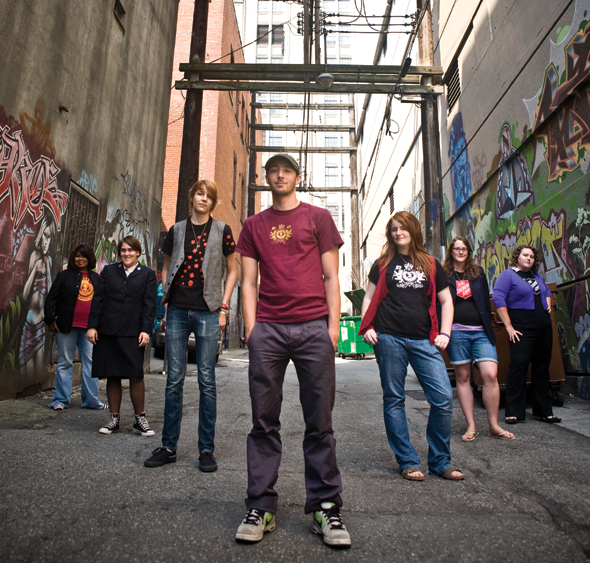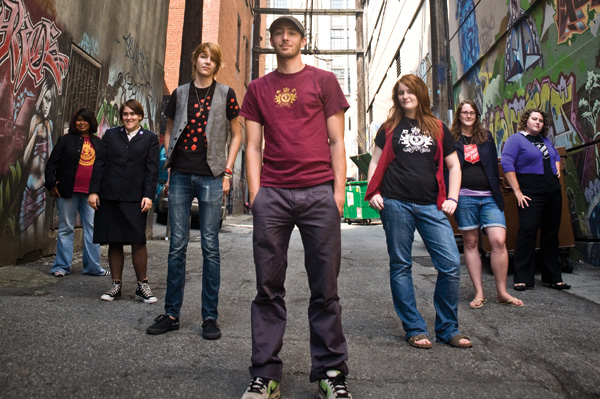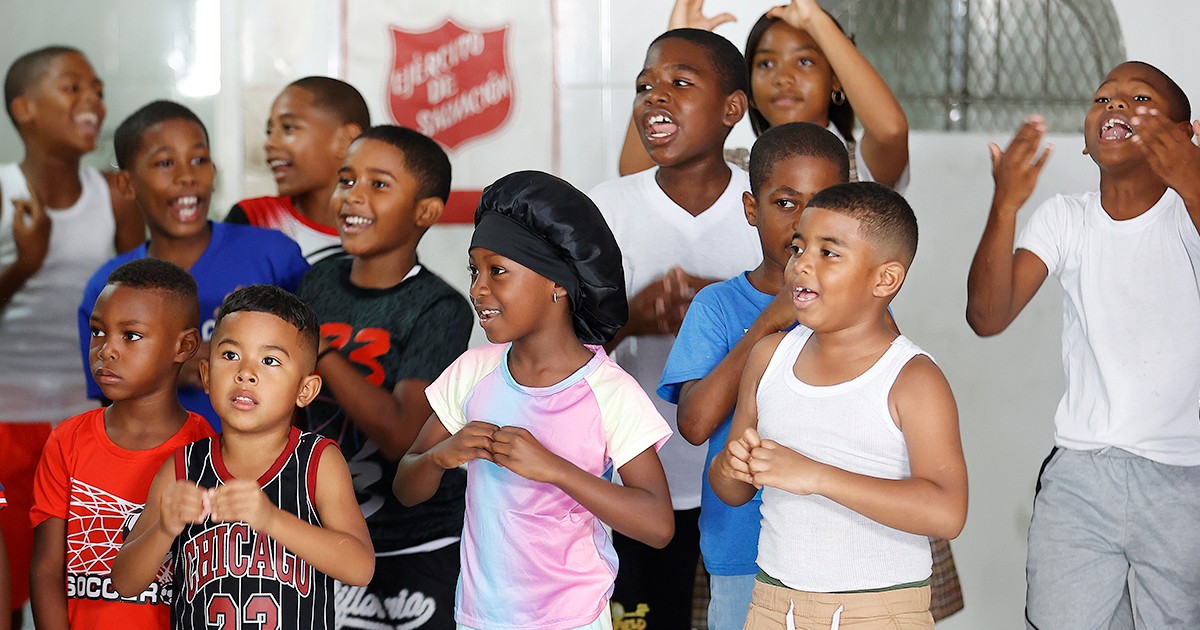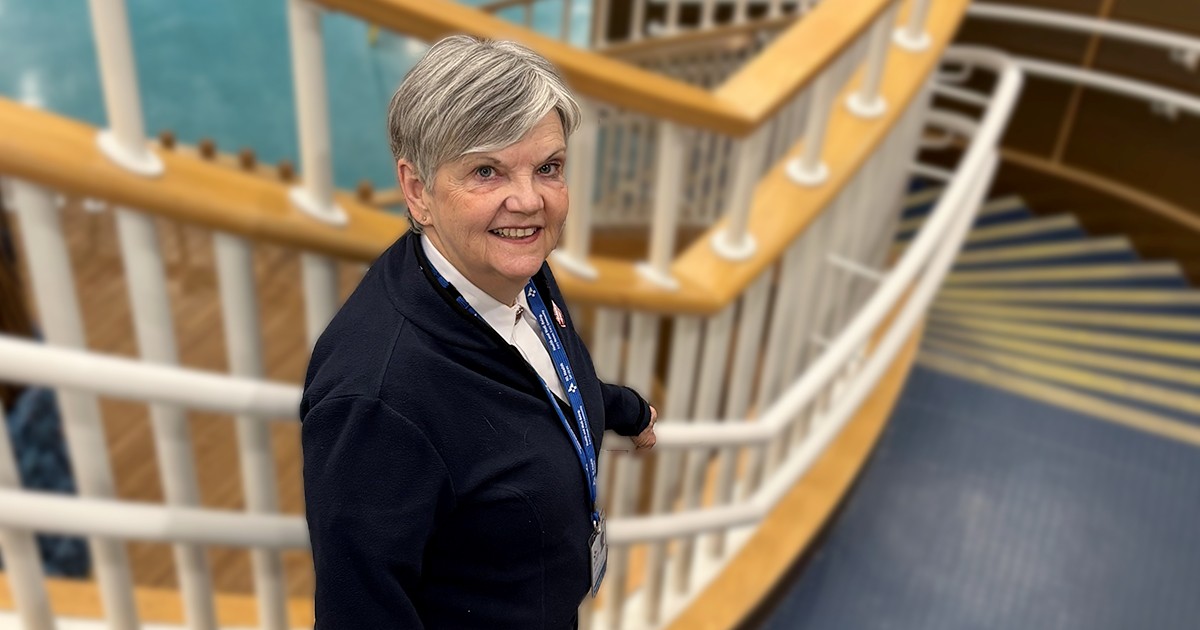 The War College is not a typical school. In 2002, Majors Stephen Court and Danielle Strickland founded it as a project of Vancouver's 614 Corps. “The college provided the opportunity for the corps to have 10-20 students who would help drive the mission of The Salvation Army in Vancouver's Downtown Eastside,” says Jonathan Evans, ministry director.
The War College is not a typical school. In 2002, Majors Stephen Court and Danielle Strickland founded it as a project of Vancouver's 614 Corps. “The college provided the opportunity for the corps to have 10-20 students who would help drive the mission of The Salvation Army in Vancouver's Downtown Eastside,” says Jonathan Evans, ministry director.
Students come from all over the world, including the United States, the United Kingdom, Australia, India and Nigeria. Most of the students are college age, but some mature students in their late 50s have attended. During their year at the War College, the students live in a slum hotel in the Downtown Eastside, the poorest neighbourhood in Canada. They take classes and have homework—essays, assignments, presentations—but they also spend time in hands-on mission work in the streets.
“We brief people with classroom knowledge, then apply that knowledge in mission,” explains Evans. “We do our practicum concurrently with our theory, and that gives our training a high level of authenticity and intensity.”
Life Together
Courses on holiness, Christian doctrine and Salvation Army worldview share time at the War College with practical classes such as Airforce, which involves walking around the neighbourhood praying; shifts at Re:cre8, a community café in the back of a shelter; and Drill, a physical exercise program. After spending two terms at the War College, students go on to summer placements at corps throughout North America.
The experience of living in a dirty, diseased and drug-filled neighbourhood can be difficult. Dan White, who went to the War College as part of the 2005-2006 Holy Session and now works as a chaplain at the Centre of Hope in London, Ont., describes the shock of arriving at the hotel. “My initial reaction was one of horror,” he says. “The intensity was hard, but in the midst of that intensity something very good was produced. It shifted my perspective and made my heart come alive.”
That doesn't mean the classroom hours aren't also useful. “I gained a lot of knowledge in spiritual disciplines, as well as practical advice, such as how to structure a sermon,” says Donny Melanson, a student of the 2006-2007 Revolution Session. Since graduating, Melanson works at the Vancouver Harbour Light and leads a Celebrate Recovery program at Cross-Culture. Megan Smith, a graduate of the 2007-2008 Incendiary Session, is currently studying peace and conflict studies at the University of Toronto. She says, “The courses and the ethics lessons at the War College prepared me for what I'm doing now.”
The War College's other unique aspect is class size. Sessions are kept deliberately small so that a close community can be maintained. “The role of faculty extends beyond teaching classes,” explains Carla Evans, spiritual formation director of the program. “Everyone teaching at the War College has a vested interest in the lives of our students; several live in our community and are part of the 614 Corps. The students become a part of our ministry for the year and are befriended, discipled and encouraged by teachers and other leaders.”
 “The biblical model is church people growing together in family,” says Jonathan Evans. “Jesus taught and lived in other people's homes. We're trying to replicate that, so people can see Christ in our midst.”
“The biblical model is church people growing together in family,” says Jonathan Evans. “Jesus taught and lived in other people's homes. We're trying to replicate that, so people can see Christ in our midst.”
This small community is valuable to students. “It is truly amazing to live in community as a Christian and experience how God works among us to build up the body of Christ,” says Sylvia Overton, a graduate of the 2009-2010 War Cry Session. “On a daily basis we learn to be accountable to each other and to support, pray for, direct and guide each other. When you live this way, your Bible becomes a living reality.”
Training Goals
As is evident in its name, the War College has adopted the military metaphors of The Salvation Army. The 24/7 prayer room is called the War Room and its outreach ministry is known as Street Combat. This language deliberately invokes Salvation Army tradition, which is one of the school's purposes. “We want to honour our past and be true to our birthright in The Salvation Army,” explains Jonathan Evans.
At the same time, this language links Christians through a shared goal. “Militant language is a strong motif throughout the Scriptures,” says Evans. “It's not exclusive to The Salvation Army. We're fighting against sin and death in the name of Jesus and by the power of the Holy Spirit. If you're willing to fight, we're willing to fight alongside you.”
The War College also serves as an introduction to The Salvation Army's brand of spiritual warfare for students of other denominations. Overton came to the War College from an Anglican background. “I believe the War College can be a form of interdenominational schooling for any Christian wanting to go deeper with God,” she says. “Our session had a variety of denominations—Catholic, Anglican, charismatic and Salvation Army—and we had fun, growing in respect for one another and learning from each other.”
In many cases, the school serves as pre-training for training college. “Students who graduate and are committed to The Salvation Army long-term are equipped to take positions of service and leadership within our ranks,” says Carla Evans. “Many graduates have gone on to enter officer training colleges in their home territories.”
Smith, who hopes to become a Salvation Army officer after finishing her university studies, says, “The War College was the best preparation I could have had for being an officer.” Joshua and Jenn Ivany, former students, are currently enrolled as cadets at the Winnipeg College for Officer Training in the Friends of Christ Session.
Not all students go on to training college—nor are they expected to. “What we try to do is highlight who people are made to be, to help them discover their callings and encourage them to be obedient to God,” says Jonathan Evans. “Some students remain at the college for a second and third year as a way to continue to be discipled, stay true to the mission of the Army and explore where God's taking them.”
Nicole Brindle, a graduate of the 2004-2005 Martyrs Session, has remained at the War College as the program's recruiting sergeant. “For some of us, staying at the War College as part of the 614 community is beneficial, but we recognize that for others, moving back to their home corps, starting outposts or going to training college is right for them—and we encourage that,” she says.
Strategic Objectives
No matter where they end up, students agree that their experience at the War College has guided them. White, who is originally from England and who studied marketing in university, says that “without the experience at the War College, I would have been in another country, at another job—it completely changed everything.”
For Brindle, who entered the War College knowing only that she wanted to serve God, the experience revealed a way to follow that goal. “The War College has taught me how to align my plans with God's plans,” she says.
The Vancouver campus has plans to expand its training. Shorter programs, such as its weekend-long youth conferences, Ready and Willing (RAW) and Booth-Tucker Institute, allow those with time and money constraints to still learn from the college. Expanded awareness of the program is another goal. “Young people—actually, all people—are dying to live meaningful lives,” Carla Evans says. “If more opportunities were provided and known, God would certainly draw people there.”
“We want to stay true to what we were called to do, which is to win the world for Jesus starting in the Downtown Eastside,” says Jonathan Evans. “My prayer is that God will use us to humbly bring renewal to our students, our community and even the greater Church.”










I was also wondering if there was some sort of financial aid because i cant afford to attend or if there is long term payment options ? ... I dunno if this is for m but i feel as though i am being called and i am just unsure if i am spiritually ready and want to prepare myself any advise ?